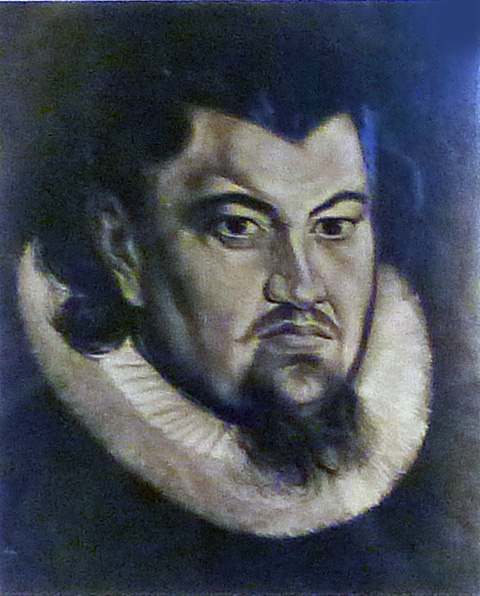Nikolaus Krell on:
[Wikipedia]
[Google]
[Amazon]
 Nikolaus Krell (c. 1551 – 9 October 1601), chancellor of the elector of Saxony, was born at Leipzig, and educated at the university of his native town.
About 1580 he entered the service of Christian I, the eldest son of Augustus I, elector of Saxony, and when Christian succeeded his father as elector in 1586, became his most influential counselor. Krell's religious views were Calvinistic or Crypto-Calvinistic, and both before and after his appointment as chancellor in 1589 he sought to advance his own religious views at the expense of the reigning Lutheran Orthodoxy which was the sanctioned religion of
Nikolaus Krell (c. 1551 – 9 October 1601), chancellor of the elector of Saxony, was born at Leipzig, and educated at the university of his native town.
About 1580 he entered the service of Christian I, the eldest son of Augustus I, elector of Saxony, and when Christian succeeded his father as elector in 1586, became his most influential counselor. Krell's religious views were Calvinistic or Crypto-Calvinistic, and both before and after his appointment as chancellor in 1589 he sought to advance his own religious views at the expense of the reigning Lutheran Orthodoxy which was the sanctioned religion of  Krell was not the only individual accused of Crypto-Calvinism. The influential physician
Krell was not the only individual accused of Crypto-Calvinism. The influential physician
''Leben, Schicksal und Ende des Dr. Nicolaus Krell''
Leipzig (1798). * images commemorating Krell's execution. * has contemporary images of the suppression of Calvinism in Saxony. {{DEFAULTSORT:Krell, Nikolaus Politicians from Leipzig People from the Electorate of Saxony Leipzig University alumni 1550s births 1601 deaths 17th-century executions in the Holy Roman Empire Philippists People executed in the Holy Roman Empire by decapitation Executed people from Saxony
 Nikolaus Krell (c. 1551 – 9 October 1601), chancellor of the elector of Saxony, was born at Leipzig, and educated at the university of his native town.
About 1580 he entered the service of Christian I, the eldest son of Augustus I, elector of Saxony, and when Christian succeeded his father as elector in 1586, became his most influential counselor. Krell's religious views were Calvinistic or Crypto-Calvinistic, and both before and after his appointment as chancellor in 1589 he sought to advance his own religious views at the expense of the reigning Lutheran Orthodoxy which was the sanctioned religion of
Nikolaus Krell (c. 1551 – 9 October 1601), chancellor of the elector of Saxony, was born at Leipzig, and educated at the university of his native town.
About 1580 he entered the service of Christian I, the eldest son of Augustus I, elector of Saxony, and when Christian succeeded his father as elector in 1586, became his most influential counselor. Krell's religious views were Calvinistic or Crypto-Calvinistic, and both before and after his appointment as chancellor in 1589 he sought to advance his own religious views at the expense of the reigning Lutheran Orthodoxy which was the sanctioned religion of Electorate of Saxony
The Electorate of Saxony, also known as Electoral Saxony (German: or ), was a territory of the Holy Roman Empire from 1356–1806. It was centered around the cities of Dresden, Leipzig and Chemnitz.
In the Golden Bull of 1356, Emperor Charles ...
. Calvinists
Calvinism (also called the Reformed Tradition, Reformed Protestantism, Reformed Christianity, or simply Reformed) is a major branch of Protestantism that follows the theological tradition and forms of Christian practice set down by John Ca ...
were appointed to many important ecclesiastical and educational offices; a translation of the Bible with Calvinistic annotations was published; and Krell took other measures to attain his end.
In foreign politics, also, he sought to change the traditional policy of Saxony of close collaboration with the Habsburg emperors, acting in unison with John Casimir, regent of the Electorate of the Palatinate, and reaching out to Henry IV of France and Elizabeth I of England.
These departures from Saxon tradition, coupled with the jealousy felt at Krell's high position and autocratic conduct, made the chancellor very unpopular, and when the elector died in October 1591 he was deprived of his offices and thrown into Georgenburg prison of the Königstein Fortress
Königstein Fortress (german: Festung Königstein), the "Saxony, Saxon Bastille", is a hilltop fortress near Dresden, in Saxon Switzerland, Germany, above the town of Königstein, Saxony, Königstein on the left bank of the River Elbe. It is one ...
by order of Frederick William, duke of Saxe-Altenburg, the regent for the young Elector Christian II.
His trial was delayed until 1595, and then, owing partly to the interference of the imperial court of justice (''Reichskammergericht''), dragged on for six years. At length it was referred by Emperor Rudolph II to a court of appeal at Prague, and Krell sentenced to death. He was decapitated in the Jüdenhof in Dresden on 9 October 1601. He is commemorated by a paving stone with the inscription "Kr" at the spot of his execution in the Dresden Stallhof.
 Krell was not the only individual accused of Crypto-Calvinism. The influential physician
Krell was not the only individual accused of Crypto-Calvinism. The influential physician Caspar Peucer
Caspar Peucer ( , ; June 1, 1525 – September 25, 1602) was a German reformer, physician, and scholar of Sorbian origin.
Personal life
Early life
Caspar Peucer was born on June 1, 1525, in Bautzen, (Sachsen, Germany) and died on Septembe ...
was also charged and subsequently imprisoned for years.
Notes
References
* This, in turn cites: ** . ** . ** . ** .Further reading
* * * . * . * . * . *''Leben, Schicksal und Ende des Dr. Nicolaus Krell''
Leipzig (1798). * images commemorating Krell's execution. * has contemporary images of the suppression of Calvinism in Saxony. {{DEFAULTSORT:Krell, Nikolaus Politicians from Leipzig People from the Electorate of Saxony Leipzig University alumni 1550s births 1601 deaths 17th-century executions in the Holy Roman Empire Philippists People executed in the Holy Roman Empire by decapitation Executed people from Saxony